Philosophy
- Degree Type Bachelor of Arts
- Department Philosophy
- Academic Division The College
- Offerings Major Minor


The Department of Philosophy at Washington and Lee University provides a liberal education that engages students with fundamental questions of existence, knowledge and value.
Philosophy
Dedicated faculty ensure that our students receive quality philosophical training in the history of philosophy, in the central subfields of philosophy and in symbolic logic. Faculty prepare students to understand and think critically about complex views, to question their assumptions and to come to informed conclusions. The department is committed to fostering a collaborative environment for student and faculty inquiry, in which faculty pursue scholarship informed by their teaching and in its own right.
With an unusually large number of professors for a college our size, the W&L Department of Philosophy offers a wide array of courses in historical and contemporary philosophy across different traditions and approaches. Examples include ancient Greek and Chinese philosophy, early modern European philosophy, contemporary ethical theory, and courses on AI and human enhancement. A majority of our professors also teach in interdisciplinary programs, demonstrating the relevance and centrality of philosophy to business, the arts and the sciences.
The most important reason to study philosophy is that it explores life’s biggest questions. Is there a God? What is a person? Do humans have free will? What is acting justly? What is a good life? What are my obligations to others, to non-humans and to the environment? What, if anything, can we know about the universe around us?
Studying philosophy teaches students to read and write critically, to analyze concepts and problems carefully, and to express solutions and arguments clearly and forcefully. Thus, studying philosophy prepares students for many different career paths: business, law, medicine, teaching, and postgraduate research in the humanities and sciences.
Students majoring in philosophy very often double major in business, other humanities disciplines or the social and natural sciences.
Philosophy majors are admitted to law school at a higher percentage than any other major and have the third-highest acceptance rate to medical school. Philosophy majors also outperform most other majors on the LSAT, GMAT and GRE, and their midcareer salaries are the highest in the humanities. Midcareer salaries for philosophy majors are even higher than those of accounting, business management and marketing majors.
Opportunities
Outside the classroom at W&L, philosophy majors enjoy a wide array of intellectually stimulating experiences. Students meet world-renowned philosophers who come to campus to give public lectures and lead philosophical discussion over coffee or a meal. Many philosophy majors study abroad in locations such as University College at Oxford, University of Copenhagen, College Year in Athens and University of St. Andrews, to name a few. Each year, W&L sends a team of mostly philosophy students to compete in a statewide collegiate Ethics Bowl hosted by The Virginia Foundation for Independent Colleges (VFIC).
Students present philosophy papers at conferences around the country, and many are published in undergraduate philosophy journals. Departmental funding is available to help defray costs. Washington and Lee is home to its own successful annual event, the Mudd Undergraduate Conference in Ethics. This conference, which is supported by the university’s Roger Mudd Center for Ethics, is the only open undergraduate conference in the country solely dedicated to the academic study of ethical issues. All accepted speakers have the opportunity not only to present their papers at the conference, but also to have them published in the The Mudd Journal of Ethics. Leadership opportunities are available to W&L philosophy students for both the conference and the journal.
Philosophy students who meet the criteria may be inducted into Phi Sigma Tau, the International Honor Society in Philosophy. Senior majors who qualify may pursue Honors in Philosophy with a year-long research project culminating in a thesis and defense before the department. Every year the department honors top students with the Edward Dodd Award, Young Scholarship, Charles Thomas Boggs Prize and William Wells Chaffin Memorial Scholarship.
Outcomes
W&L’s tightly knit and supportive alumni network is always willing to assist current students and recent graduates with advice and introductions in the working world.
Our graduates go on to excel in graduate school and work in a variety of professions, including philosophy, law, medicine, business, advertising, engineering, computer science, education, coaching and more.
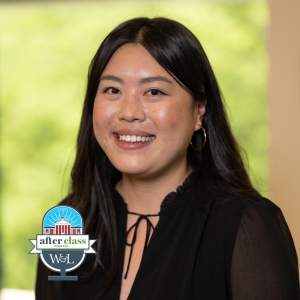
‘W&L After Class’ Podcast Releases New Episode Featuring Angela Sun
To kick off the seventh season of “W&L After Class,” assistant professor of philosophy Angela Sun reflects on aesthetics from the lens of her field of research.
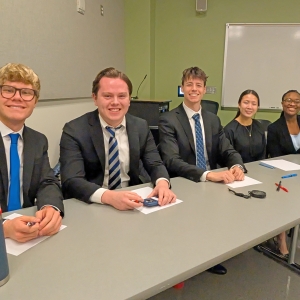
W&L Ethics Bowl Team Qualifies for National Competition
The team secured its bid with a runner-up showing at the APPE Intercollegiate Ethics Bowl regional competition in Baltimore.
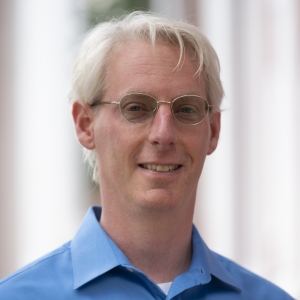
Nathaniel Goldberg Publishes New Book
The professor of philosophy’s book, “Philosophy of the History of Philosophy,” was published in November.
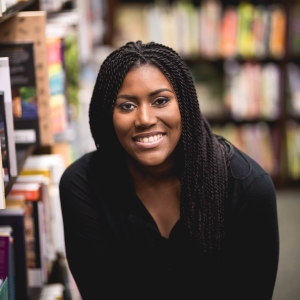
Dominique Lamb ’08 to Deliver Lecture on Housing Equity
The Nov. 13 lecture on W&L’s campus is free and open to the public.

‘W&L After Class’ Podcast Releases New Episode Featuring Will Dudley
The Washington and Lee University president discusses his role as an educator and the ways in which a liberal arts experience crafts an interesting mind.
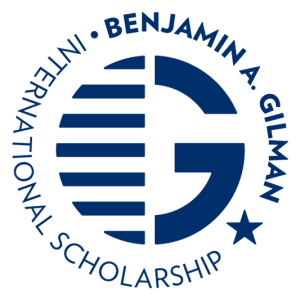
Eight W&L Students Awarded Gilman Scholarships to Study Abroad
This round of recipients marks a record-setting Gilman Scholar cohort for W&L.
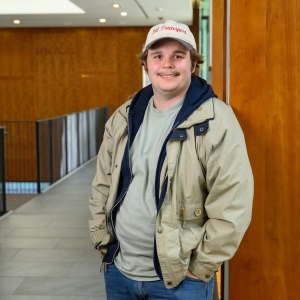
Meet Chris Smith ’26
A SHECP internship solidified Smith’s career path to become an advocate for those in need.
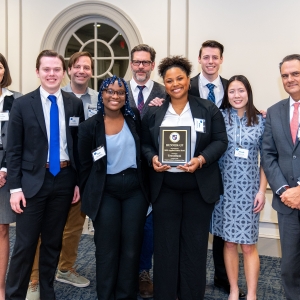
W&L Student Team Named Runner-Up at VFIC Applied Ethics Bowl
Five students from Washington and Lee University participated in the annual statewide competition in February.
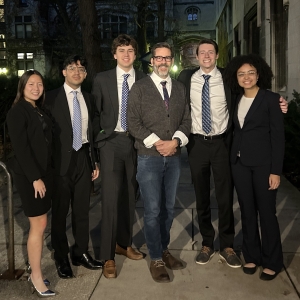
W&L Ethics Bowl Team Qualifies for National Competition
The team secured its place with a third-place finish at the APPE Intercollegiate Ethics Bowl regional competition in Chicago.
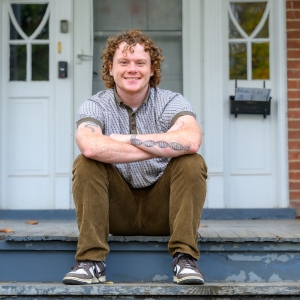
Meet Nolan Rickett ’27
This neuroscience major takes advantage of W&L’s beautiful natural surroundings, including walking the back campus trails.
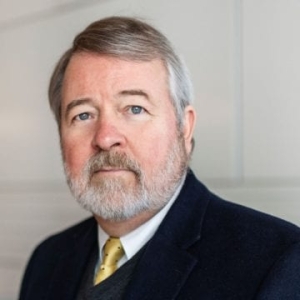
Lawyer and Historian Paul Lombardo to Deliver Lecture on Buck v. Priddy Court Case
The Nov. 18 lecture is open to the public and marks the centenary of the case argued in Amherst County, Virginia.
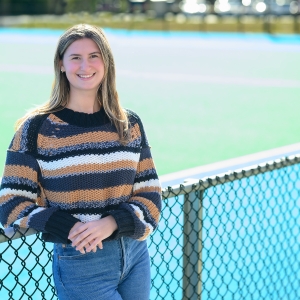
Meet Jenna Bernstein ’25
Bernstein discovered a passion for coding at W&L and has sought out every opportunity to get involved with technology on campus.
Sample Courses
At W&L, we believe education and experience go hand-in-hand. You’ll be encouraged to dive in, explore and discover connections that will broaden your perspective.
- Social Inequality & Fair Opportunity
- Philosophy of Mind
- Political Philosophy
- Medical Ethics
- Philosophy & Emerging Technologies
- Metaphysics: Existence & Reality
PHIL 242
Social Inequality & Fair Opportunity
An exploration of the different range of opportunities available to various social groups, including racial, ethnic and sexual minorities, women and the poor. Topics include how to define fair equality of opportunity; the social mechanisms that play a role in expanding and limiting opportunity; legal and group-initiated strategies aimed at effecting fair equality of opportunity and the theoretical foundations of these strategies; as well as an analysis of the concepts of equality, merit and citizenship, and their value to individuals and society.
PHIL 375
Philosophy of Mind
A consideration and assessment of dualism and materialism and of various theories of the relation between the mental and the physical, such as the identity theory, functionalism and supervenience.
PHIL 260
Political Philosophy
Is the government’s power over its citizens morally legitimate? Do citizens have any political obligations to their government? What is individual liberty and how should it be respected? How should a commitment to liberty be balanced against a concern for equality and the common good? Social Contract doctrine—to which the Declaration of Independence adverts—provides answers to these questions. This course surveys the Social Contract theories of three of the most influential political philosophers of the modern age, whose writings shaped our conception of the republic and its principles: Thomas Hobbes. John Locke and Jean Jacques Rousseau.
PHIL 346
Medical Ethics
An examination of the issues arising out of the human impact of modern biomedical research and practice. Specific issues are selected from among the following: abortion, contraception, death and dying, experimentation/research, genetics, in vitro fertilization, intellectual and developmental disabilities, public health/community medicine, science/technology, transplantation and patients’ rights.
PHIL 196
Philosophy & Emerging Technologies
By some accounts, technology is the defining aspect of modern society that shapes how we experience the world. At the same time, technology is accelerating at a pace that challenges our ability to take stock of the ethical issues at hand. In this seminar, we take a critical look at a number of cutting-edge technologies that are still largely on the horizon and attempt to decipher the ethical issues they present and how such problems might be mitigated. Some emerging technologies we critically analyze include artificial intelligence, human enhancement, virtual reality, surveillance technologies, synthetic biology, self-driving cars, and killer robots.
PHIL 274
Metaphysics: Existence & Reality
An examination of central issues in metaphysics. Topics include free will and determinism; cause and effect; space and time; being and existence; and possibility, actuality and necessity.
Meet the Faculty
At W&L, students enjoy small classes and close relationships with professors who educate and nurture.


Paul Gregory
Professor of Philosophy, Department Head
- P: 540-458-8182
- E: gregoryp@wlu.edu
Gregory’s teaching and research interests include philosophy of mind, philosophy of language, logic, epistemology, metaphysics, the history of analytic philosophy, and W.V. Quine.


Melina Bell
she/her
Law, Justice, and Society Interim Program Head and Professor of Philosophy and Law
- P: 540-458-8899
- E: bellm@wlu.edu
Bell is a part of the faculty in the Women’s, Gender, and Sexuality Studies Program, the Shepherd Program for the Interdisciplinary Study of Poverty and Human Capability, and the Law, Justice, and Society Program. She also teaches at the Law School. Professor Bell’s primary research interests are in political philosophy, philosophy of law, and feminist philosophy.


William Dudley
W&L President and Professor of Philosophy
President Dudley teaches a philosophy seminar each Fall Term, often focusing on topics in higher education. His current course examines the W&L mission statement. He is the author of two books and numerous articles on German Idealism, which is his area of scholarly expertise.


Nathaniel Goldberg
he/him
Professor of Philosophy
Goldberg teaches courses on the history of Western European philosophy, logic, the philosophy of language, and philosophy and science fiction. He has written dozens of articles and five books on epistemology, metaphysics, philosophy of language, and philosophy and pop culture.


Li Kang
Assistant Professor of Philosophy
- P: 540-458-8304
- E: lkang@wlu.edu
Kang teaches Introduction to Theories of Knowledge and Reality, and Chinese Buddhist Philosophy. Her research deals with metaphysics, Buddhist philosophy, Chinese philosophy and philosophy of science.
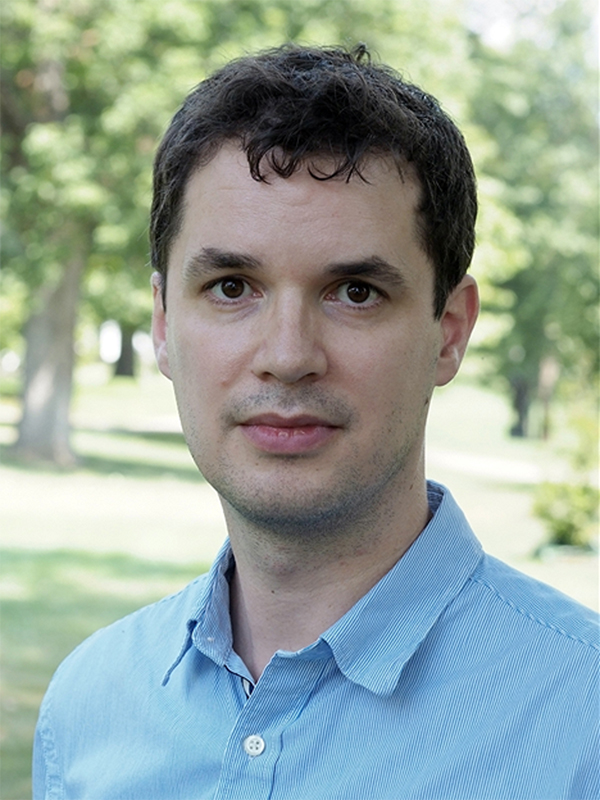

Andrew McGonigal
Visiting Assistant Professor of Philosophy
McGonigal teaches courses on logic, aesthetics, epistemology and ethics/value theory. He has researched aesthetics, metaphysics and metaethics.


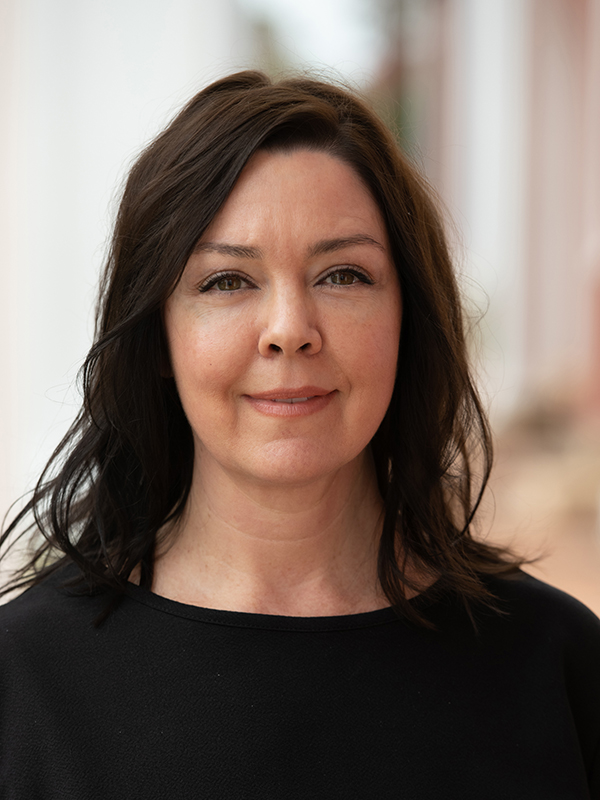

Erin Taylor
Associate Professor of Philosophy
- P: 540-458-8051
- E: taylore@wlu.edu
Taylor teaches courses on ancient Greek philosophy, medicine, research, poverty and medical ethics. She has researched normative ethics, political philosophy and bioethics.







